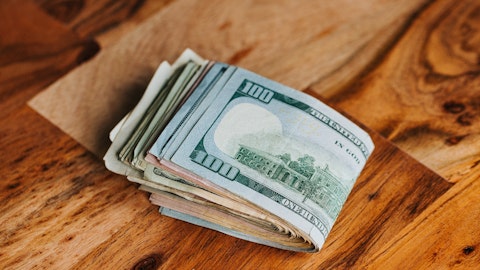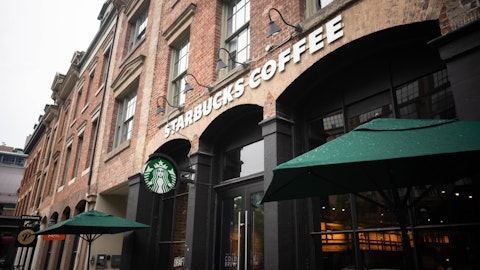4. Starbucks Corporation (NASDAQ: SBUX)
Number of Hedge Fund Holders: 61
Starbucks Corporation (NASDAQ: SBUX) is an American coffeehouse chain and roastery. The company was founded in 1971 and has headquarters in Seattle. It started as a retailer and roaster of ground coffee, tea, and spices. As of 2021, the company has over 32,000 outlets in 80 countries.
In Q2 FY21, Starbucks Corporation (NASDAQ: SBUX) generated $6.7 billion in revenue, up from $5.9 billion, presenting an 11% year-over-year growth. The EPS of $0.62 beat the market consensus by $0.09. The U.S. accounted for $4.6 billion of the gross revenue, showing a 9% growth in comparable sales. Due to strong quarterly results, many investment banks raised their price targets on the SBUX stock, such as Oppenheimer, Tigress Financial, MKM Partners, and Morgan Stanley. In July, Oppenheimer raised its price target on SBUX to $140 and rated it as an ‘Outperform’. In the past year, the SBUX stock has delivered a 58.3% return to shareholders.
At the end of Q1 2021, 61 hedge funds tracked by Insider Monkey have positions in Starbucks Corporation (NASDAQ: SBUX), worth $4.4 billion.
Wedgewood Partners released its Q1 2021 investor letter and mentioned Starbucks Corporation (NASDAQ: SBUX) and other stocks in it. Here is what the firm has to say about SBUX:
“As we have observed Starbucks through the unpredictable events of the past year, we believe all the things we liked about the Company’s competitive position before the pandemic have been turbocharged by the pandemic. We always have maintained the Company had no serious competition, anyway, and that in both large growth markets (U.S. and China), there was enormous fragmentation of share that would allow the Company to continue to expand through market expansion (especially in China) and through share gain versus small competitors. In fact, when we last discussed Starbucks, there was a lot of noise about competition in China from a newly established domestic competitor, Luckin Coffee, and that situation quickly dissolved into farce. In any case, had Luckin been a legitimate business, we had maintained that China was a massive market – and one in which coffee consumption was massively underpenetrated in comparison to other markets. We believed too that there was plenty of room for multiple large competitors to exploit.
The pandemic disaster over the past year truly highlights the Company’s financial strength in comparison to its small competitors, most of which struggled to survive, and many of which didn’t make it. While there is no perfect data, we have seen estimates from industry groups and restaurant distributors that as many as 15-20% of small, independent restaurants across the broad food and beverage industry may have closed permanently as a result of the pandemic, sadly. Starbucks not only survived due to its superior financial position; they also used its financial resources to invest in a variety of expanded or new capabilities, including the addition of drive-through capacity, new “walk-through” pick-up locations in urban areas, increased investment in technology to drive speed within the stores and drive-through lanes, and expansion of its loyalty program. These could have been viewed, prior to the pandemic, as a fairly big advantage in terms of convenience alone versus the Company’s small primary competitors. In the age of the pandemic, though, one might consider something like a drive-through an absolute necessity, as customers choose not to expose themselves to the interior of restaurants or to other people…” (Click here to see the full text).





